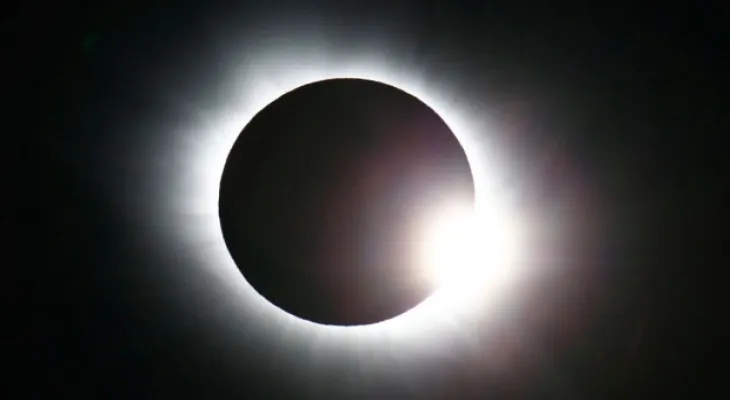Search here
Newspaper
Search here

Arab Canada News
News

Published: April 7, 2024
A professor of astronomy confirmed, "The upcoming great eclipse is literally a 'once in a lifetime event' as the last time it occurred in the Toronto area was in 1925, and the next eclipse is expected in 2144."
Robert Cockcroft, professor of astronomy and physics at McMaster University, told CTV News Toronto on Thursday: "It is a once-in-a-lifetime event." "It happens when you get the perfect alignment between the moon and the sun, it is just a coincidence that they appear on the same side of the sky."
"The sun is about 400 times larger than the moon, but it is also 400 times farther from the Earth, so they appear the same size allowing the moon to periodically cover the sun."
Cockcroft pointed out that the total eclipse itself is not a particularly rare event, and said it actually occurs about every 18 months or so in different parts of the world.
He added, "If you are willing to travel to see the eclipse, it is not a rare event, you can see one every year or two." "But having the eclipse come to you is what makes it rare, and that is what makes it something that only happens once in a lifetime."
In Ontario, a total eclipse occurred in 1979, but it was only visible in the northern parts of the province. Paul Delaney, an astronomer and professor at York University, chased the eclipse to Brandon, Manitoba, where it was also visible.
He told CTV News Toronto: "I have seen three total solar eclipses, and that was my second eclipse." It was by far the coolest thing, that was in February, and the weather was cold on the Brandon University campus, but the sky was clear. My master's thesis was based on my observation of the sun that day."
Looking back to 1925, when the last total eclipse occurred in the Toronto area, Delaney said historical records show there was a surprisingly large public involvement thanks to the Royal Astronomical Society of Canada, which was very active at that time at the University of Toronto."
Delaney continued: "The eclipse occurred shortly after the very famous solar eclipse of 1919, which essentially proved the theory of relativity." "So there was a lot of interest around the solar eclipse in the first part of the century, even though we did not have social media and so on."
He said, "The Royal Astronomical Society of Canada and the University of Toronto were very involved in ensuring public safety."
The eclipse is expected to occur on Monday at around 2 PM, and the entire event lasts about two and a half hours.
Cockcroft said, "The thing that excites everyone is the 90 seconds in the middle at 3:18 PM when the total eclipse occurs - all that excitement and effort for 90 seconds."
The complete blocking of the sun by the moon will cause darkness for a short period of time.
He said that depending on conditions and how clear the sky is at the time of the eclipse, the first thing to be noticed during a total eclipse is the solar corona, a white haze around the sun.
Delaney said he is trying to be optimistic about the weather and sky on Monday and has been monitoring weather forecasts every hour over the past week.
He said, "The snowstorms that Toronto experienced earlier last week, if predicted for Monday, would have caused me great disappointment." "Currently, the forecasts are unclear, so I am cautiously optimistic."
"But you have to take it easy; whenever you chase a solar or lunar eclipse, you have to be prepared to fail because of the weather."
In 2017, a partial eclipse was seen in the Toronto area, but only about 70% of the sun was covered. The solar eclipse coverage on Monday is expected to be 99.9 percent.
Comments